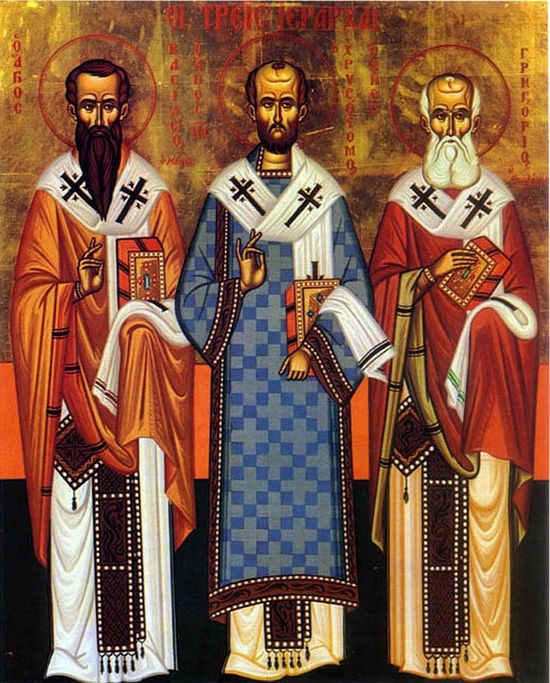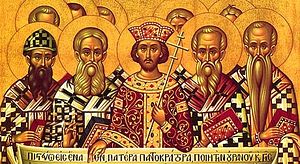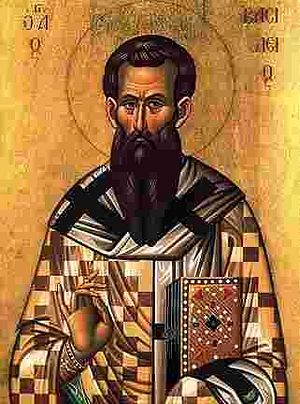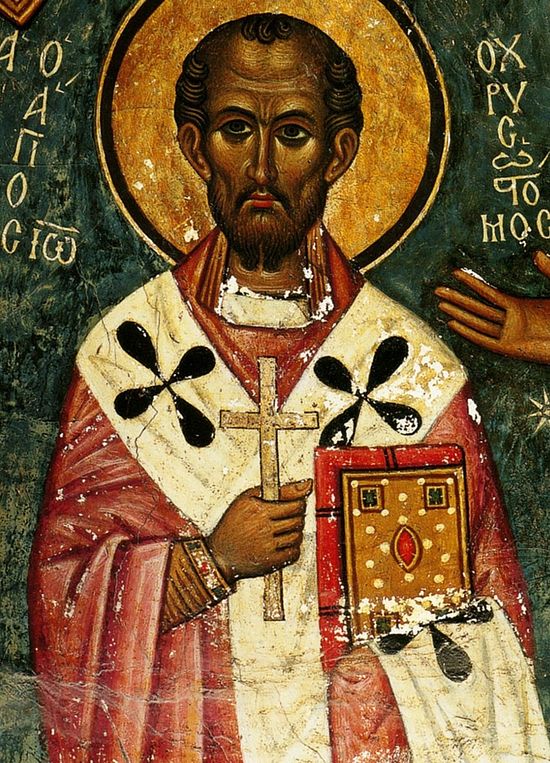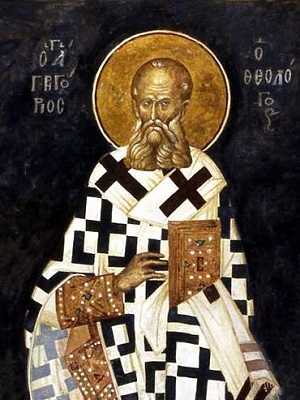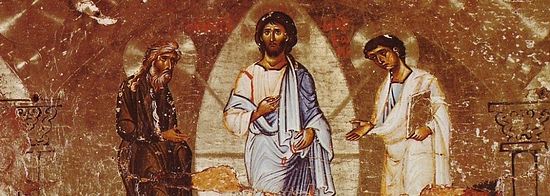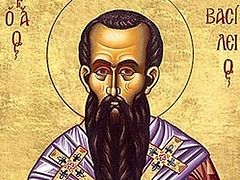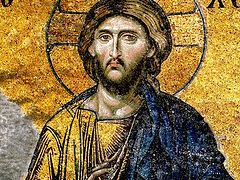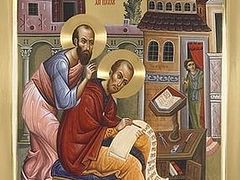The fourth century was one of great Christological and Trinitarian controversy for the holy Orthodox Church. The Ecumenical Council at Nicea in 325 proclaimed the condemnation of the theology and person of the Alexandrian presbyter Arius who taught that the Son and Word of God was but an exalted creature, created ex nihilo by the will of God, and that, therefore, there was a time when He was not. The Synod declared that the Logos is indeed of the same essence (ομοούσιος, homoousios), or consubstantial with the Father, but the controversy continued for many decades, in which St. Athanasius the Great rose up as a defender of Orthodoxy. In his efforts against the Arians he made many important theological contributions, including his able defense of the homoousion, drawing a line of demarcation between the Creator and the creation,[1] distinguishing between the essence and will of God, and therefore properly distinguishing between terms that speak to the inner life of God (θεολογία, theologia) and those that speak to His outer life, in relation to His creation (οἰκονομία, economia), which had been conflated by Arius. And, as Fr. Florovsky demonstrates, St. Athanasius made the classic Orthodox distinction between the essence and energies of God, as will is on the level of the energies.[2]
His important contributions were picked up by, and expanded on by the great Cappadocian Fathers—Sts. Basil the Great, Gregory the Theologian, and Gregory of Nyssa, and also by St. John Chrysostom, in their struggles with the later Arians, who went beyond the position of Arius to proclaim that the Son is unlike (ανόμοιος, anomoios) or dissimilar to the essence of the Father. According to St. Basil, the first to openly teach that the Son is unlike the Father in essence was Aetius the Syrian[3], whose theology was championed by his secretary Eunomius, who was enthroned as the bishop of Cyzicus in 360. While the early Arians confessed that “the Father cannot be described by the Son, for the Word does not know the Father perfectly and accurately, neither can He see Him perfectly. Moreover, the Son knows not His own essence as it really is,”[4] the later Arians, known as the Anomoeans or Eunomians, pronounced that the Son does know the essence of the Father, and moreover, “God knows no more of his own substance than we do . . . whatever he knows, the same also you will find without any difference in us,”[5] arguing that to know the essence of God does not indicate consubstantiality with God.
In the Eunomian understanding of language, applied terms or names reveal the very essence of a being, and in this case, of God Himself. St. Basil summarizes the Syntagmation of Aetius as: “We believe that unbegottenness is the substance of the God of the universe,” and therefore, “We believe that the Only-Begotten is unlike the Father in substance.”[6] If the Father’s unbegottenness is identified with His essence, then the Son’s begottenness reveals His essence to be unlike and below that of the Father. Accordingly, the Holy Spirit, Who is neither begotten nor unbegotten, but proceeds from the Father, is relegated to a yet lower, third rank of nature. Eunomius writes: “Since from [the saints] we learn that he is third in both dignity and order, we believe that he is third in nature as well.”[7] This particular use of language is explained by Eunomius in his Apology, which thereby also reveals his theology:
We call the Son ‘offspring’, therefore, in accordance with the teaching of the Scriptures. We do not understand his essence to be one thing and the meaning of the word which designates it to be something else. Rather, we take it that his substance is the very same as that which is signified by his name, granted that the designation applies properly to the essence. We assert, therefore, that his essence was begotten—not having been in existence prior to its own coming to be—and that it exists, having been begotten before all things by the will of its God and Father.[8]
Against both his linguistic premise and his conclusions the holy Fathers of the Church rose up in defense of the homoousion of the Nicene Council, as well as the transcendence and unknowability of the essence of God. The Orthodox-Eunomian debate was between not only two different theologies—variant Christologies and Triadologies which necessarily lead to variant soteriologies—but between two different methods of doing theology.
It is important to note that these Fathers of the Church had no interest in controversy for controversy’s sake. These saints were keenly aware of the ever-present danger of forsaking revelatory theology for the prideful attraction of philosophy, and they understood that Eunomius had fallen into precisely this trap. However, they were not interested in mere philosophical debates, but rather were fighting for the very life-giving faith of the Church, that the “pernicious heresy” of Eunomius might not “do harm to [the] guileless faith” of the simple believers entrusted to their care.[9] St. Basil declares that he only dared to dig into this mystery, which until him was honored in silence, because Eunomius’ heresy demanded an Orthodox reply[10], and St. Gregory of Nyssa only took up the fight on behalf of his brother Basil after his repose, for he too had “learned to honour in silence what transcends speech and thought,”[11] for as St. John states, God is angered by inquisitiveness, but to refrain from meddling into His mysteries is to glorify Him.[12] The seriousness with which these holy bishops addressed the Eunomian heresy can be seen in the words of St. Peter, bishop of Sebaste, to his brother St. Gregory of Nyssa, that Satan himself speaks flimsy and rotten doctrines through Eunomius,[13] St. John’s assertion that the claim to know God as He knows Himself is the root of all evil,[14] and St. Gregory’s declaration that Eunomius’ doctrine is a preparation for the Antichrist, and that Eunomius is himself Antichrist.[15]
Well versed in philosophy, logic, rhetoric, etc, the Cappadocian Fathers and St. John Chrysostom understood the value of these studies, but also their limitations and faults, and being holy men of the Church they understood that the path to knowledge of and union with God is trod only within His holy Church. St. Basil, St. Gregory of Nyssa and St. John all make this point quite forcefully. St. Basil states:
Even now we are not going to repudiate the solid foundation of our faith in the Father and the Son because the manner of the begetting is ineffable and utterly inconceivable. If we are going to measure all things by comprehension and suppose that that which is incomprehensible to our reasoning does not exist at all, the reward of faith will be gone, the reward of hope will be gone. How could we still be worthy of the blessings stored up for faith in invisible realities, if we trust only in that which is evident to our reasoning?[16]
Likewise, St. Gregory of Nyssa speaks of the man who places too much faith in his own intellectual abilities:
But I should say to him that he who declares that the discovery of reality is attainable, has of course advanced his own intellect by some method and logical process through the knowledge of existent things, and after having been trained in matters that are comparatively small and easily grasped by way of apprehension, has, when thus prepared, flung his apprehensive fancy upon those objects which transcend all conception,
and to demonstrate the feebleness of the human intellect in the face of ultimate reality, he challenges such a man to explain even the reality of created things: “Let, then, the man who boasts that he has attained the knowledge of real existence, interpret to us the real nature of the most trivial object that is before our eyes, that by what is knowable he may warrant our belief touching what is secret: let him explain by reason what is the nature of the ant . . .”[17] Furthermore, St. John states that it is only once we have swept our minds clean of all the teachings of the world that we will be free to hear the words of God,[18] and:
Therefore we are commanded to abolish reasonings and not to exalt them; we are ordered to destroy sophistries and not to arm ourselves with them. “For the reasonings of mortals are timid” [Wis. 9:14], the inspired writer says . . . even if something which is proved by reasoned arguments is true, these arguments do not provide an assurance which is full enough nor a faith which is sufficient for the soul.[19]
The fallenness of human nature, which extends to the intellect and reason is overcome only by the grace of Christ through His Body, the Church, and so for the Orthodox Christian, prayer is “the mother for our philosophy and way of life.”[20]
However, against this wise counsel, Eunomius and his followers deemed fit to investigate into the hidden mysteries of God, and moreover they did so apart from the wisdom of the Scriptures and the teachings of the Fathers, and in doing so they destroyed the very faith they claimed to protect. The Fathers who took up the good fight against Eunomius show his theology to be but a web of endless contradictions and philosophical blunders. Although his main tenet which the Fathers combated is that “unbegotten” is the essence of the Father and “begotten” is the contrary essence of the Son, at other times he speaks of the “generated [begotten] essence” of the Son, which, as St. Gregory of Nyssa points out, opens the door to speak also of the Father’s “ungenerate [unbegotten] essence,” such that “generated” and “ungenerate” are reduced to but attributes of the essences.
St. Basil had earlier made the same observation.[21] In this way, these attributes can no longer be used to posit dissimilarity in essences, but indicate rather the distinction of Persons, just as Adam and Abel possess the same human essence although Adam was unbegotten and Abel begotten.[22] St. Gregory writes: “for things that are identical on the score of being will not all agree equally in definition on the score of personality,”[23] and St. John writes: “There are common names to show that the essence is exactly the same; there are proper names to characterize what is proper to the personal realities [υποστάσεις]. The names “Father” and “Son” characterize what is proper to the personal realities; the names “God” and “Lord” show what is common.”[24] Whereas the Arian mind thought foremost of natures and conflated terms proper to nature and person, one of the Cappadocians' great theological contributions was to apply “unbegotten” and “begotten” to the Persons of the Holy Trinity, thereby raising person (ὑπόστασις) to the same ontological level as essence (ουσία), such that neither is pre-eminent.
Not only is Eunomius’ mind first drawn to essence, but his philosophical system logically ends in denying the personhood of the Son and the Holy Spirit. He foregoes the scriptural terms of “Father,” “Son,” and “Holy Spirit” and introduces in their places “Supreme and Absolute Being,” “another existing through it, but after it,” and “a third ranking with neither of these two.”[25] St. Gregory of Nyssa detects in this a sinister purpose: “this system of his is secretly intended to effect the setting aside of all real belief in their personality, while in appearance and in mere words confessing it. A moment’s reflection upon his statement will enable any one to perceive that this is so.”[26] St. Basil similarly objects that God has already bestowed upon His Son “the name which is above every name,” therefore one ought to be content to use Scriptural terms in order to appropriately glorify God.[27] St. Gregory reasons that Eunomius replaces “Father” and “Son” because they conjure obvious notions of relationship that imply the homoousion which Eunomius so adamantly rejects.[28] St. Basil and St. John likewise prefer “Father” because it is Scriptural and necessitates a Son, while “unbegotten” is too vulnerable to Eunomian interpretation.[29]
Hebrews 1:3 states that the Son in relation to the Father is “the express image of his person (υποστασεως), but since Asterius, a friend and fellow student of Arius in the early fourth century, the Arians had referred to the Son as the image of the Father’s will, or energy (ενέργεια) as St. Gregory of Nyssa reports it.[30] This teaching is enshrined in the second creed of the Antiochian Dedication Council of 341 which states that the Son is the “exact Image of the Godhead, Essence, Will, Power and Glory of the Father.”[31] This conflation of the essence and energies of God has been pointed out by Fr. John Romanides, who notes that the Eunomians therefore believed that the Son of God is a product of a created energy of the Father.[32] As St. Gregory of Nyssa deftly illustrates, Eunomius thus teaches a pentarchy rather than the Christian Trinity, wherein a created energy which is external to and “follows” the Father produces the Son, and a lesser created energy which is external to and “follows” the Son produces the Holy Spirit. Thus, “How can Eunomius rank our Lord next after the Almighty at all, when he counts Him third only, with that mediating 'energy' placed in the second place? The Holy Spirit also according to this sequence will be found not in the third, but in the fifth place . . . “[33]
Accordingly, although Eunomius professes that “begotten” reveals the essence of the Son, he ultimately prefers to refer to Him as “something made” rather than “something begotten,” because, again, “something begotten” necessitates “complete and indistinguishable affinity with the begetter.”[34] If the Father possesses truth, goodness, light, life, etc in His essence, then the Son and Holy Spirit, as created beings essentially opposed to the Father, do not possess such qualities naturally, and certainly not to the extent of the Father, and are therefore capable of their opposites—falsehood, evil, darkness and death, etc. Furthermore, the logical conclusion of Eunomius’ conception of contrary essences is that the Son will never even participate in the light of the Father.[35] If terms such as “something begotten” and “something made” speak to essences, then the end result of the Eunomian heresy is that all things “begotten” or “made” necessarily share in the same essence. Although Eunomius formally confesses the Son to be above the rest of creation, he inadvertently makes Him equal to all things created.[36] How can a creature, capable of sin and death but incapable of even participating in the light and glory of the Father possibly be our Savior?
As the Fathers exhaustively demonstrate and plainly state, Eunomius destroys the Orthodox faith at every turn. St. Basil writes: “we have been sealed in the Father and the Son through the grace received in baptism. Hence when he dares to deny these terms, he simultaneously takes exception to the whole power of the gospels,” and St. Gregory of Nyssa asks, “Why are they baptized into Christ, if He has no power of goodness of His own? . . . Why do they believe in the Holy Ghost . . . How are they regenerate by baptism from their mortal birth, if the regenerating Power does not possess in its own nature infallibility and independence?”[37] The consubstantiality of the Son and the Holy Spirit with the Father, and thus the complete identification of essence and energies is absolutely necessary for the Christian to continue in hope, for it is from the Son and the Holy Spirit that we receive eternal life as they lead the faithful to the Father. This “community of nature” reveals the “community of will” of the Holy Trinity that all men be saved.[38]
St. Gregory of Nyssa beautifully expounds the Orthodox doctrine of salvation in a passage which clearly illustrates the necessity of the full divinity of the Son:
The Godhead “empties” Itself that It may come within the capacity of the Human Nature, and the Human Nature is renewed by becoming Divine through its commixture [ἀνακρασεως] with the Divine . . . when the true Life that underlay the flesh sped up, after the Passion, to Itself, the flesh also was raised up with It, being forced upwards from corruption to incorruptibility by the Divine immortality . . . at His death . . . He Who, because He is the Lord of glory, despised that which is shame among men, having concealed, as it were, the flame of His life in His bodily Nature, by the dispensation of His death, kindled and inflamed it once more by the power of His own Godhead, fostering into life that which had been brought to death, having infused with the infinity of His Divine power that humble first-fruits of our nature, made it also to be that which He Himself was—making the servile form to be Lord, and the Man born of Mary to be Christ, and Him Who was crucified through weakness to be Life and power, and making all that is piously conceived to be in God the Word to be also in that which the Word assumed, so that these attributes no longer seem to be in either Nature by way of division, but that the perishable Nature being, by its commixture with the Divine, made anew in conformity with the Nature that overwhelms it, participates in the power of the Godhead.[39]
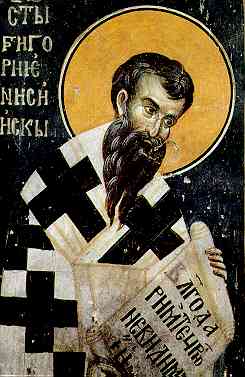 St. Gregory of Nyssa
St. Gregory of Nyssa
That the faithful might not fall into the abysses of Eunomius, St. John, emphasizing purity of life and doctrine, exhorts:
Let us join the rightness of our way of life and the deeds we do to the correctness of the teachings we embrace so that what pertains to our salvation may not be divided in two. But nothing can set your lives straight and make them exactly right so much as can your constant attendance at church and your eager attention in listening to what is said here. What food is to the body, the teaching of God’s word is to the soul.[43]
Communion with God and knowledge with God is given to us in and through the teachings and worship of His Church. St. John later states that our stains, which keep us from vision and knowledge of Christ, are wiped away by reading the Scriptures, by prayer and almsgiving, and through peace with one another.[44] Mutual peace requires humility of every Christian believer, for in humbling ourselves we meet and become like the Prince of Peace Who made Himself known to human nature through His humiliation. Through humility we receive all promised blessings by the grace of the Father, Son, and Holy Spirit.[45] Humility demands that we adhere to the inherited Tradition from Scripture and the Fathers, and thus St. Gregory argues that his consonance with the Fathers is enough to prove his position.[46] The reality of Orthodox worship is itself humbling. St. John calls on the faithful to be sobered by the angelic hosts that accompany their hymns to the Master, and for each to “rid his mind of all earthly things, let him transfer himself entirely to heaven and let him stand next to the very throne of glory and raise his all holy hymn to the God of glory and majesty.”[47] Beside the throne of glory God lavishes Divine life on us through Christ in the Holy Spirit, Who possess this life essentially.[48]
This life is given to us most especially in the celebration and communing of the Holy Eucharist, and for this reason St. John laments that his flock would listen with zeal to his homilies but leave the church before the serving of the Gifts. They had fallen prey to the same philosophical trap as Eunomius—filling their minds with inspiring words, but leaving their souls unfed by experience. St. John critiques that their abstention from the Holy Mysteries proves that they neither grasped his words nor took them to heart.[49]
Enamored with his own intellectual abilities, Eunomius too failed to grasp the “words” of the Orthodox faith. His ideas about God were drawn from the created world rather than revelation. He employed the idea of the analogia entis—the “analogy of being”—that there exists an analogy between God and His creation that raises the mind to an understanding of God. He argued that an investigation of created works would lead to the essences and the discovery that the Son is a creation of the Father, and the Holy Spirit a creation of the Son, which “indisputably” demonstrates their dissimilar essences.[50] Furthermore, examining the nature of created things, Eunomius foolishly concludes that the Son must be in truth a creation of the Father, for to beget would necessitate the same passion involved in the begetting of created beings.[51]
However, St. Gregory argues that it is impossible to argue from the created to the incomprehensible. He writes: “It is clear, even with a moderate insight into the nature of things, that there is nothing by which we can measure the divine and blessed Life,” and thus, “We think of man’s generation one way; we surmise of the divine generation in another.”[52] Eunomius’ fault is that he has failed to wean himself from the human meaning of words such as “begotten” which necessarily carry a vastly different meaning in respect to the Godhead,[53] “For when we have shaken off from the Divine and exalted doctrines all carnal and material notions, we shall be most surely led by the remaining conception, when it is purged of such ideas, to the lofty and unapproachable heights.”[54]
To these “lofty and unapproachable heights” is every person called, but it is imperative to remember precisely that they are unapproachable. The essence of God infinitely transcends all of creation and can never be known, neither by analogy nor revelation. This is the consistent teaching of the Scriptures, and the Fathers over and against the triumphalism of Eunomius. How, they ask, could he feign to know the essence of God when he cannot even grasp the essence of created things, such as the human soul, the earth, or the simple ant?[55] God revealed neither His name nor His essence to the Old Testament Patriarchs, and in the New Testament Christ Himself plainly states that “no one knows the Father except the Son” (Mt. 11:27).[56] The ways that lead to knowledge of God remain untrodden and impassable, for the nearer we draw to God the more we come to realize His incomprehensibility, and this unknowing knowing increases our reverence and piety.[57]If even God’s judgments are unsearchable, and “his ways past finding out” (Rm. 11:33), all the moreso does His essence lie beyond the capacity of human comprehension. St. Gregory the Theologian writes: “it is impossible to express Him, and yet more impossible to conceive Him . . . to comprehend the whole of so great a Subject as this is quite impossible and impracticable,” and St. Gregory of Nyssa agrees:
This is the true knowledge of what is sought; this is the seeing that consists in not seeing, because that which is sought transcends all knowledge, being separated on all sides by incomprehensibility as by a kind of darkness. Wherefore John the sublime, who penetrated into the luminous darkness, says, No one has ever seen God [Jn. 1:18], thus asserting that knowledge of the divine essence is unattainable.[58]
St. Gregory also argues that if it were good for salvation to know the essence of God then he would have revealed it to us, but He says nothing of His essence because it is unknowable.[59] Although Eunomius critiques that the Fathers “worship ye know not what” [Jn. 4:22],[60] they respond that piety and salvation demand only that we know that He is, not what He is.[61] Because no term is revelatory of the Divine essence,[62] those terms applicable to God are, of necessity, in respect to the Divine Persons and energies, and the realm of economia, and it is by the energies that we may know and commune with God. The Cappadocians and St. John continued this distinction made by St. Athanasius.
Listing energies, St. Basil writes: “We say that we know the greatness of God, His power, His wisdom, His goodness, His providence over us, and the justness of His judgment; but not His very essence . . . His operations come down to us, but His essence remains beyond our reach.”[63] These operations which come down to us are spoken of by St. John Chrysostom as God’s “condescension” (συγκατάβασις). Examining his Homily 56 on Matthew, concerning the Transfiguration on Mt. Tabor, Dr. Christopher Veniamin writes that God reveals Himself to man “not by suffering change in His essence, but by conforming, shaping or adapting Himself to the capacity of His creature,” in a descent and participation in the life of the creature. This “participation” is, as was the Taboric light, an eschatological revelation which foreshadows the fullness of the Father’s glory in which the Son will return at the end of days.[64] Speaking also of the energies of God as “light,” St. Gregory writes in another beautiful passage of beholding three equal lights which shine incomparably greater than the sun,[65] and in his Life of Moses he expounds a theology of experiencing God in light and darkness once idolatrous conceptions have been left behind. This is an experience of knowing in not knowing, and seeing in not seeing, which transcends the entirety of human nature, including the nous: “by the intelligence’s yearning for understanding it gains access to the invisible and the incomprehensible, and there it sees God.[66] This experience, beyond all comprehension and description is the very reason for which Christ was Incarnate and the very purpose for which man was created.
In combating the neo-Arian Eunomian heresy, the Cappadocian Fathers and St. John Chrysostom, largely drawing upon the work of St. Athanasius, put forth a solid theology of essence, energies, and person that has helped defined, as far as is possible, the Person of Christ, the Holy Trinity, and the salvation of man, in the Church down to this very day. And this Truth remains relevant for Christians today. St. Basil observed that to claim to know the essence of God is to make oneself equal with God, and such self-conceit is the most dangerous passion for it is a participation in the condemnation of Satan himself,[67] and is the same sin of self-deification of Adam and Eve. To make oneself equal with God will necessarily lead to a lower vision of Who God is, Who the Incarnate Christ is, and to what He calls mankind. Sinful humanity cannot bear the perfect and all-glorious Christ of the Orthodox Tradition Whose light reveals our darkness, and so we pull Him down the slippery slope that leaves Him no more than a wise teacher, as so many view Him today, as we pull ourselves down the slippery slope to equality with the irrational beasts.
But the uniqueness of the Orthodox Church is precisely that it alone among the Christian confessions refuses to reduce the perfection of Christ, and what it means to be perfect in Christ. The martyric spirit of the martyrs themselves and the monastics after them is not driven and sustained by a wise teacher, but rather by the God Who is Life and Who offers that Life to us through His salvific economy in His Church. Denying the full divinity of the Son, the Arian theology places the union of Father and Son at the level of will, and accordingly that which links creation to the Father is a union of wills.[68] This is also the logical end of Nestorianism. With Christ as a mere man, salvation by transformative deification is traded for the moralistic pursuit of “being a good person,” and the Gnostic comfort of “knowing” Christ. Ironically, to be content to be a “good person” is in reality a denial of true personhood which is granted to men by virtue of creation according to the image and the capacity for the likeness of Christ. Without theosis, without the intimate knowledge of God, the theology of the person fades away, and the western values of “freedom” and “individuality” show themselves to be but empty concepts that shackle mankind in non-existence, because those who reject Truth and Life are properly termed “not existing.”[69] But man is called to existence—to Truth and Life—which is to communicate with the divine energies, “beyond” which lies the unknowable essence of God.
Works Cited
—St. Alexander of Alexandria. "Deposition of Arius." Athanasius: Select Works and Letters. Ed. Philip Schaff, D.D., LL.D., Henry Wace, D.D., and Archibald Robertson. Vol. 4. Peabody, MA: Hendrickson, 1994. 69-72. Nicene and Post-Nicene Fathers Second Ser.
—St. Athanasius the Great. "On the Councils of Ariminum and Seleucia (De Synodis)." Athanasius: Select Works and Letters. Ed. Philip Schaff, D.D., LL.D., Henry Wace, D.D., and Archibald Robertson. Vol. 4. Peabody, MA: Hendrickson, 1994. 451-80. Nicene and Post-Nicene Fathers Second Ser.
—St. Basil of Caesarea. Against Eunomius. Trans. Mark DelCogliano and Andrew Radde-Gallwitz. Ed. David G. Hunter. Vol. 122. Washington, D.C.: Catholic University of America, 2011. The Fathers of the Church.
----- Introduction. Against Eunomius. Trans. Mark DelCogliano and Andrew Radde-Gallwitz. Ed. David G. Hunter. Washington, D.C.: Catholic University of America, 2011. 3-78.
----- "Letter CCXXXIV." Basil: Letters and Select Works. Ed. Philip Schaff, D.D., LL.D. and Henry Wace, D.D. Trans. Rev. Blomfield Jackson, M.A. Vol. 8. Peabody, MA: Hendrickson, 1994. 274. Nicene and Post-Nicene Fathers Second Ser.
—Eunomius. "The Apology of Eunomius." Eunomius: The Extant Works. Trans. Richard Paul. Vaggione. Oxford: Clarendon, 1987. 34-75.
—Florovsky, G. "The Concept of Creation in Saint Athanasius." Ed. F. L. Cross. Studia Patristica 6 (1962): 36-57, reproduced in Aspects of Church History (vol. IV in the Collected Works).
—Gregg, Robert C., and Dennis E. Groh. "The Centrality of Soteriology in Early Arianism." The Anglican Theological Review 59 (1977): 260-78.
—St. Gregory Nazianzen. "Oration XXVIII: The Second Theological Oration." Cyril of Jerusalem, Gregory Nazianzen. Ed. Philip Schaff, D.D., LL.D. and Henry Wace, D.D. Trans. Charles G. Browne, M.A. and James E. Swallow, M.A. Vol. 7. Peabody, MA: Hendrickson, 1994. 288-301. Nicene and Post-Nicene Fathers Second Ser.
—St. Gregory of Nyssa. "Against Eunomius." Gregory of Nyssa: Dogmatic Treatises, Etc. Ed. Philip Schaff, D.D., LL.D. and Henry Wace, D.D. Trans. William Moore, M.A. and Henry A. Wilson, M.A. Vol. 5. Peabody, MA: Hendrickson, 1994. 33-248. Nicene and Post-Nicene Fathers Second Ser.
----- The Life of Moses. Trans. Abraham J. Malherbe and Everett Ferguson. New York: Paulist,1978. Classics of Western Spirituality.
—St. John Chrysostom. On the Incomprehensible Nature of God. Trans. Paul W. Harkins. Vol. 72. Washington, D.C.: Catholic University of America, 1984. The Fathers of the Church.
—Romanides, J. S. "THE LORD YAHWEH OF GLORY IN THE OLD AND NEW TESTAMENTS Part 2." 10 May 2012. <http://www.romanity.org/htm/rom.18.en. augustine_ unknowingly_rejects_the_doctrine.02.htm>.
—Socrates Scholasticus. "Ecclesiastical History." Socrates, Sozomenus: Church Histories. Ed. Philip Schaff, D.D., LL.D. and Henry Wace, D.D. Vol. 2. Peabody, MA: Hendrickson, 1994. 2-178. Nicea and Post-Nicene Fathers Second Ser.
—Veniamin, Christopher. "Saint John Chrysostom and the Light of Tabor." Patristic & Byzantine Society (Merton College, University of Oxford: Hilary Term, 1994). Published in Alive in Christ X.2 (Summer 1994): 29-33.

